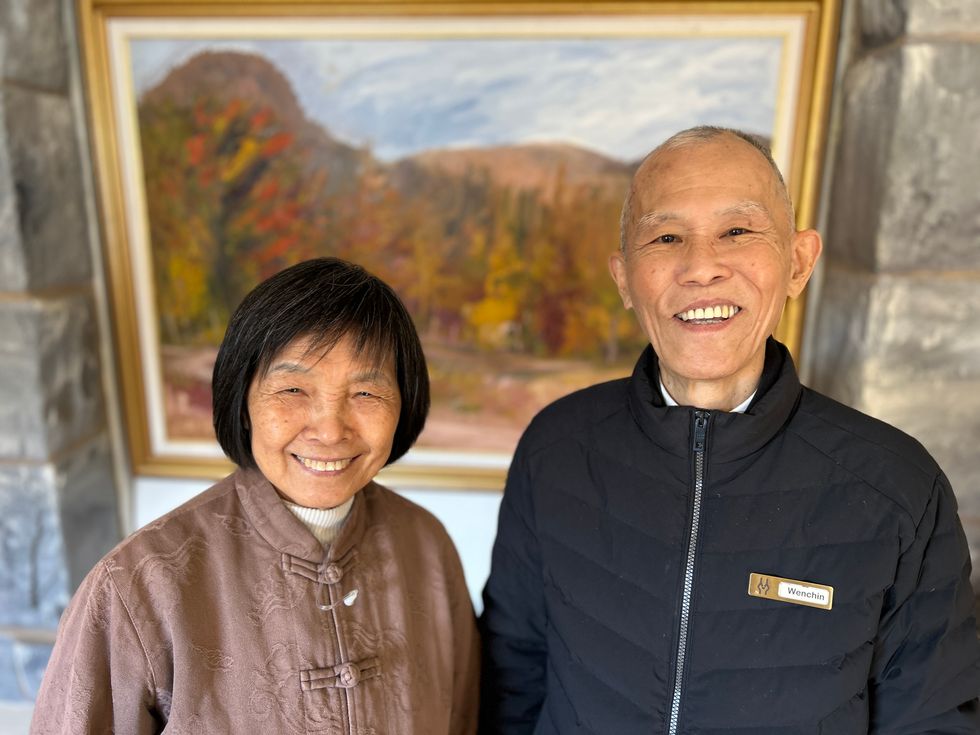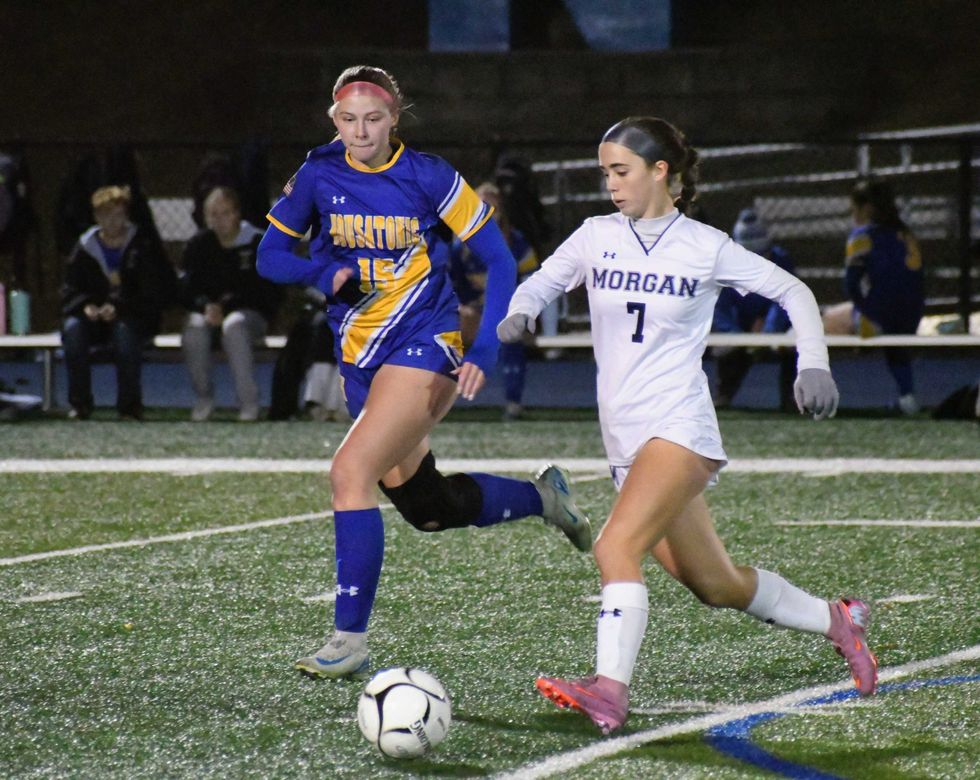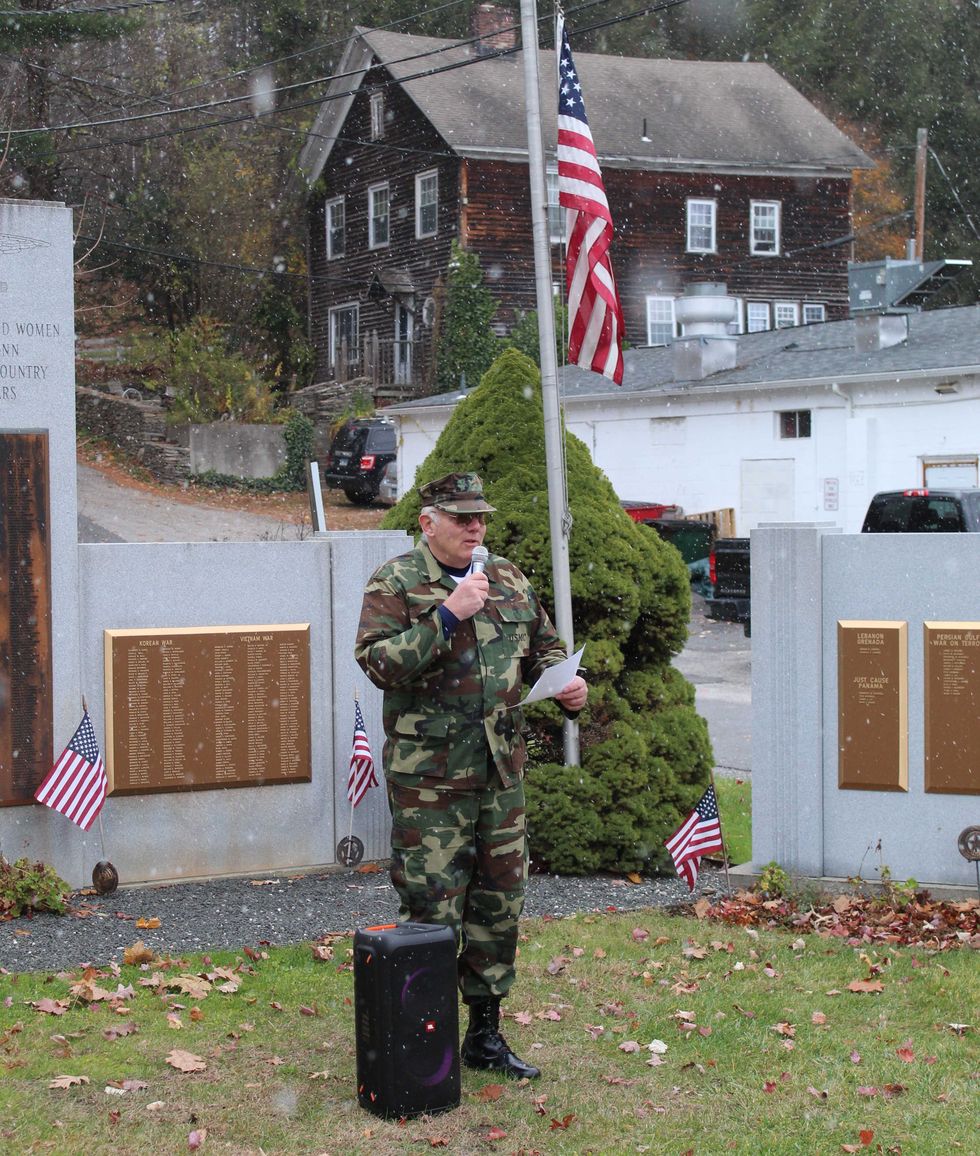Tea for the soul: Exploring harmony and tranquility in Norfolk

Mrs. Li-Jin Chung and Mr. Wenchin Tsai Photo by Jennifer Almquist

Mr. Wenchin Tsai and Mrs. Li-Jin Chung greeted visitors with welcoming smiles at the open house held Sunday, Nov. 5, at the Connecticut-Asia Cultural Center on Westside Road.
Mr. Tsai, who manages the tour guides for the Center, explained their mission is to “promote cultural exchange to enhance mutual understanding among people. This is a place where you can explore the roots of spiritual thought that have influenced the world.”
Beyond the ornate metal gates emblazoned with the logo of the Connecticut-Asia Cultural Center lies a world that enchants, educates and humbles the viewer. The marble reception area displays its motto—“Love, Mutual Support, and Peace”—surrounded by the Chinese characters for gentleness, kindness, respect, frugality, yielding, benevolence, righteousness, propriety, wisdom and sincerity.
As the tour began, Mrs. Chung continued: “The Center opened on Aug. 6, 2022, to introduce Asian culture through education and dialogue, and to integrate with the local community with the goal of creating a more harmonious society. We must walk together as a team, as we are all the same under our skin.” Mrs. Chung, formerly a systems analyst at Bell Labs, volunteers her time at the Center “because I am passionate about our mission.”
Housed in an extraordinary stone castle built at the turn of the century, the Center contains museum-style art and history exhibits exploring the background and meaning of Buddhism, Taoism, Confucianism, and the spiritual and mystical aspects of the Incan and pre-Columbian culture of Peru. Young docents, volunteers who come from as far away as Montreal, are on hand to answers questions, bring fresh glasses of water, and knowledgeably guide the curious through three floors of interactive, mysterious and informative displays.
Sculptures, paintings from Taiwan and Canada, ancient artifacts, stained glass windows, calligraphic scrolls, and brilliant silk ceremonial robes glowing in the light fill the senses. There is a tunnel of glass lit from within that has water flowing down its sides to help visitors feel tranquil in their Spiritual Exploration Zone.
While the purpose of the museum is serious, there are flights of fancy. For instance, in one display, a button asks visitors to choose whether they pray for peace. There is a hand suspending a globe that, if the wrong answer is given, pulls the Earth underwater and a film plays showing global catastrophic events; push the “yes” button and the message is hope, light and salvation. In a separate building on this 48-acre estate, there is a Peruvian cultural exhibit, which has at its centerpiece a life-sized llama serving as a backdrop for a selfie photo booth.
Entering the vast Victorian dining room, Mrs. Chung explained that in 1998 when the Confucian Study Association purchased the property, it was in a state of disrepair. The funding for the restoration project has come from private sources around the world. Craftsmen from Taiwan were brought to Norfolk to reproduce the mahogany panels and coffered ceilings from the heyday of this massive stone house, which was designed by Henry Hornbostel for his widowed client, Pulitzer-Prize-winning Serbian physicist and inventor Michael I. Pupin, who wrote in his memoir, “From Immigrant to Inventor”: “In 1897 I bought a farm at Norfolk. This blessed spot where I regained my health and happiness, became my real American home and I have never had any desire to seek a better haven of happiness in any other place.” There is a display in the museum honoring the origins of the home including an image of Pupin and his friend Albert Einstein.
On Nov. 5, the Center held an open house and tea ceremony for the community to enjoy. A table set with soft linens, flowers and a row of teacups waited in a sunny alcove of the great paneled room. A row of guests joined the two women, who explained the tradition and meanings behind the aesthetic tea ceremony they call the Tao of Tea. They served red and green teas from Ali Mountain in Taiwan.
In a stone castle built to restore the soul of a man, it is fitting that its walls contain an organization that believes “The earth is the home we all share. By reducing conflicts and living in harmony and mutual prosperity, we are fulfilling our responsibility of protecting the earth. To achieve this goal relies on people being able to awaken and to manifest universal love, tolerance and mutual assistance. In this way we can honor the possibility of peaceful coexistence among people and create a bright and happy future.”
For more information: ctasiaculture.com
Call: 877-274-2285
The Connecticut-Asia Cultural Center
207a Westside Road
Norfolk, Connecticut 06058
The Center was open this year on the first weekend of every month, April–November 2023. Saturdays and Sundays, from 10 a.m. to 4 p.m.
It will reopen in the spring.
NEWTOWN — Housatonic Valley Regional High School's girls soccer team's state tournament run concluded in the semifinals with a 4-2 loss to Morgan High School Wednesday, Nov. 12.
The final four finish was the deepest playoff push for Housatonic since 2014. Lainey Diorio scored both goals and keeper Vi Salazar logged 10 saves in the semifinal game.
"It's an unfortunate loss but you know they played their hearts out," said HVRHS coach Don Drislane. "Awesome season."

It was the final soccer game for HVRHS’s two senior captains: Ava Segalla and Madeline Mechare. Segalla ended her varsity career as the leading goal scorer in school history with a total of 133.
Morgan's size and speed on the field helped the Huskies dominate possession and earned them a bid to the Class S girls soccer championship for the second year in a row. In 2024, Morgan lost in penalty kicks to Coginchaug High School.
This year, the Huskies will face Old Saybrook High School in the Class S championship game at Trinity Health Stadium in Hartford on Saturday, Nov. 15 at 10 a.m. Old Saybrook defeated Canton High School 1-0 in the semis.
Local writer shares veterans’ stories in Malcolm Gladwell’s ‘Medal of Honor’ podcast
SHARON, Conn. — After 20 years as a magazine editor with executive roles at publishing giants like Condé Nast and Hearst, Meredith Rollins never imagined she would become the creative force behind a military history podcast. But today, she spends her days writing about some of the most heroic veterans in United States history for “Medal of Honor: Stories of Courage,” a podcast produced by Malcolm Gladwell’s company, Pushkin Industries.
From her early days in book publishing to two decades in magazines and later a global content strategist for Weight Watchers, Rollins has built a long and varied career in storytelling.
“I’ve learned a lot with each career shift, but the higher I went up the masthead, the less it was about writing and editing,” said Rollins. “I missed the creative process.”
While the podcast isn’t her first writing project, it marks her first foray into audio storytelling.
“During the pandemic I used to listen to mostly true crime podcasts when I was doing the laundry, driving my kids somewhere or working in the garden,” she said. Now Rollins gets to write one, and approaches each episode with awe and a reporter’s curiosity.
After 30 years of friendship with Malcolm Gladwell, the pair decided to collaborate on a project that would combine their shared journalism roots with stories that celebrate bravery and courage.
“Malcolm approached me about a project, and he was looking for a subject that he believed would really bring people together in this fractured political time we’re going through,” said Rollins.
Enter “Medal of Honor.”
The podcast’s namesake is the highest U.S. military decoration for valor, awarded for “conspicuous gallantry and intrepidity at the risk of life above and beyond the call of duty.” Each episode brings to life the story of a Medal of Honor recipient — often with the cinematic pacing and emotional resonance of a feature film.
“Medal of Honor” released its second season this summer, and production on a third season is underway. While Season One was narrated by Gladwell himself, Season Two introduced a new voice with firsthand experience. J.R. Martinez is a former U.S. Army soldier, author, motivational speaker and winner of Dancing with the Stars Season 13.
Writing for two very different narrators, Rollins said, has been both a challenge and a joy.
“As we’ve gotten to know each other and gotten deeper into this project together, I can almost predict how J.R. will react to certain moments,” she said. “He brings so much heart and humanity to the stories.”
Both her father and father-in-law served as Marines, but Rollins said military history was never top of mind until Gladwell pitched her the idea.
“The deeper you get into a subject you don’t know about, the more excited you get about it,” she said. “It’s been a way for me to learn about the incredible sacrifice woven into our country’s history.”
Rollins approaches each episode of “Medal of Honor” by looking first at the act of sacrifice itself, which she describes as “a moment that often happens in a flash.”
She dives deep into research, gathering biographical details from their upbringing and motivations to the circumstances that led them into combat. She then recreates the atmosphere of the conflict, setting the scene with vivid historical detail.
“These men would tell you they were just average guys,” said Rollins. “And if you believe that, then you have to believe we’re all capable of that same bravery or selflessness. It has really shown me the incredible courage we all have, and our ability to do right in the world.”
Chris Ohmen (left) held the flag while Chris Williams welcomed Salisbury residents to a Veterans Day ceremony at Town Hall Tuesday, Nov. 11.
SALISBURY — About 30 people turned out for the traditional Veterans Day ceremony at Salisbury Town Hall on a cold and snowy Tuesday morning, Nov. 11.
Chris Ohmen handled the colors and Chris Williams ran the ceremony.
Rev. John Nelson from Salisbury Congregational Church gave both an invocation and a benediction. The latter included this:
“We pray that those who have served and those who have died will never have done so in vain/We pray that the commitment of veterans will be an abiding call to resolve our conflicts without resorting to arms/ That one day soon we may mark the war that indeed ends all wars.”

Williams began his remarks by noting that the Veterans Day speech was usually given by the late David Bayersdorfer, who died earlier this year.
“As we honor our veterans today, let’s keep in mind that service comes in many forms. Each role, each job, each post is a vital part of what makes our military the finest in the world.”
Lloyd Wallingford sang “God Bless America” a cappella, with the crowd joining in.